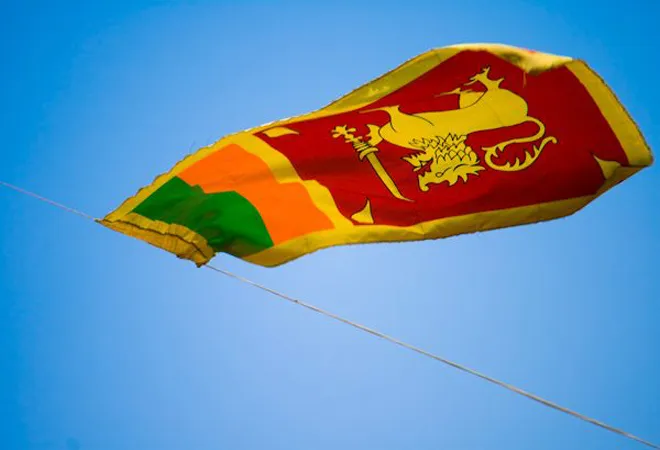-
CENTRES
Progammes & Centres
Location
Sri Lanka's IMF rescue plan has geopolitical repercussions. The Island nation has entered a difficult terrain with China's expansionist interests and India and Japan's security concerns

In September 2022, Sri Lanka finalised a staff-level agreement with the International Monetary Fund (IMF). After witnessing months of food and energy shortages and political instability, this four-year rescue plan, worth $2.9 billion, has certainly brought a sigh of relief in the island state. However, the conditions attached to accessing this fund will prove to be difficult, compelling Sri Lanka to accommodate the regional powers’ interests, and up its balancing game.
The IMF agreement has laid down the following conditions for the Sri Lankan government: Cut on spending, increase in taxes, policies against corruption, autonomy for the central bank, and a decline in debt-to -gross domestic product (GDP) ratio. Most importantly, the IMF wants Sri Lanka to talk to its top bilateral creditors—China, Japan, and India —to restructure its loans, and seek debt relief and financial assurances. With a total debt accumulation of $51 billion, Sri Lanka owes 20 per cent of its debts to China, 9 per cent to Japan, and 2 per cent to India.
The IMF wants Sri Lanka to talk to its top bilateral creditors—China, Japan, and India —to restructure its loans, and seek debt relief and financial assurances.
For Sri Lanka, the primary challenge would be to seek concessions from its largest lender — China. China often offered large loans with high-interest rates and fewer conditions. It is the only lender contributing to 10 per cent of Sri Lanka’s overall borrowings (around $6.5 billion), yet accounting for 20 per cent of its overall debts. But China’s willingness to provide any kind of relief depends on Colombo’s capability to align with Beijing’s expansionist interests.
In 2020, China helped Sri Lanka with financial assistance worth $2.5 billion, and in 2021, China provided a $1.5- billion currency swap. However, as the relationship between both countries soured due to a disagreement over the fertiliser deal in late 2021, China’s assistance grew passive. In 2022, China offered humanitarian assistance of a mere $75 million and has withheld requests for loan restructuring and additional financial assistance worth $4 billion. On multiple occasions, China attempted to pressurise Colombo to align with its interests for additional assistance. Pushing Colombo for the 7th round of Free Trade Agreement negotiations and Chinese ship Yuan Wang-5’s docking episodes are just some of these visible examples.
India’s approach to the crisis is people-centric as well as interest-driven. Both of these factors have compelled India to assist Sri Lanka with $3.8 billion in 2022. India has tried to prevent the Sri Lankan economy from collapsing by extending credit lines, currency swaps, modernisation, investments, and emergency humanitarian supplies. That being said, to make sure the Indian Ocean is free of threats – India is offering a free-floating dock facility, and Maritime Rescue Coordination Centre, and has also provided a Dornier reconnaissance aircraft. Besides, India has also at times asked Sri Lanka to show more sensitivity to Indian interests. As a result, Colombo cancelled the Chinese energy projects in the Jaffna peninsula, offered India to modernise the strategic Trincomalee oil tank farm, and also unsuccessfully tried to deter the Chinese ship from docking in Sri Lanka.
India has tried to prevent the Sri Lankan economy from collapsing by extending credit lines, currency swaps, modernisation, investments, and emergency humanitarian supplies.
Japan, on the other hand, despite being the second largest bilateral lender to Sri Lanka, has been very cautious to respond to the crisis. Sri Lanka’s suspension of rail projects and East Container terminal in 2020 and 2021 has likely contributed to its prudent policy. Yet Japan has belatedly committed to cooperating with India and helping Sri Lanka out of the humanitarian crisis — it has provided total humanitarian assistance of $6.5 million.
In addition, Japan is concerned about its security and economic investments in the country. In recent years, with the increasing relevance of the Indo-Pacific, Japan has also shown interest in defence cooperation, Sri Lankan ports (Trincomalee and West Container Terminal), and infrastructure development. It has developed partnerships with India to further its influence in the country. These stakes along with humanitarian concerns have motivated Japan to propose a shuttle-diplomacy approach, where it could coordinate or host meetings and conferences between India and China to help Sri Lanka restructure its debts.
China’s expansionist interests, India's and Japan’s humanitarian concerns and security interests have largely influenced how these countries have responded to the Sri Lankan crisis. It is these factors that will also shape the fate of Sri Lanka’s debt re-negotiations. In this regard, the primary challenge will derive from Beijing and its expansionism. Beijing will likely continue to pressurise Sri Lanka to abide by its interests, often at the cost of Indian influence and security calculations. On the other hand, the appetite for more assistance to Colombo might wear thin in New Delhi, if Colombo continues to accommodate China. The docking episode is itself a stark reminder of India’s strong reservations. For its part, Japan and its shuttle-diplomacy attempt would prove futile if China refuses to restructure its loans.
China’s expansionist interests, India's and Japan’s humanitarian concerns and security interests have largely influenced how these countries have responded to the Sri Lankan crisis.
As a high-profile Sri Lankan delegation will visit China in the coming weeks and energise the low-level discussions on debt refinancing, much is at stake for the regional order. Balancing between these powers will be a challenge for Sri Lanka — any misadventures as in the past will only undo what Sri Lanka has achieved with its staff-level agreement.
This commentary originally appeared in Business Standard.
The views expressed above belong to the author(s). ORF research and analyses now available on Telegram! Click here to access our curated content — blogs, longforms and interviews.

Aditya Gowdara Shivamurthy is an Associate Fellow with the Strategic Studies Programme’s Neighbourhood Studies Initiative. He focuses on strategic and security-related developments in the South Asian ...
Read More +
Professor Harsh V. Pant is Vice President – Studies and Foreign Policy at Observer Research Foundation, New Delhi. He is a Professor of International Relations ...
Read More +